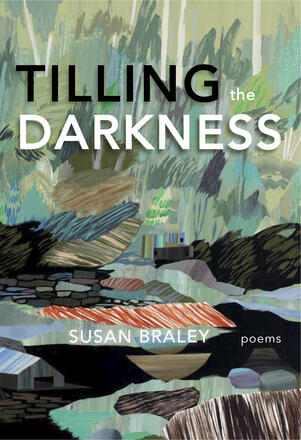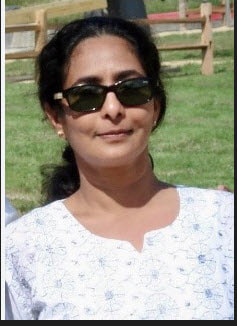Susan Braley's Tilling the DarknessReviewed by Padmaja Battani
To read Susan Braley’s inaugural collection ‘Tilling the Darkness’ is to peer into the life of a farm girl in Southern Ontario, her perceptions of birth and death, siblings and seedlings. These are intimate poems set in the backdrop of rural setting describing tractor rides, racing plastic boats at the water trough, summer corn, hired men (at the farm), and the reunion of the sisters in quite a captivating manner. One other important element of this collection is gender inequities and discrimination portrayed in fresh arenas.
She opens talking about the tractor ride with her father in ‘Only One Round’. This brought back memories of my childhood and the tractor and bullock-cart rides on our grandparents’ farms. The most remarkable feature of this poem is the way she introduces her father’s traits in a very subtle manner.
Braley transforms the mundane aspects of farm living into vibrant poems. ‘The Cream and the Milk’ is a beautiful account of milking and skimming carried out by her mother and herself. To the background of her father’s singing, the cows chewed, flicked tails. The bonding she cherished with these animals flows through this poem.
Her father shares the same care and concern for the cattle and rescuing the cattle is as important for him as keeping the kids away from the danger. When the barn burnt to its knees in the night, she tried to help him and begged to leave the barn. His silence told her to leave while the same silence calmed the cows down.
She is very candid in unpacking the expectations set for children in a religious family and the consequences when they fail to meet them. In the long narrative poem ‘Cleansed’, she describes how the strap handed down from her father’s father ‘rained down’ on her brother who preferred to be silent and did not pray even after the mother’s insistence.
She views growing up and her blossoming body in the similar lens with which she sees the seedling nubs and growing plants. A universality in the cycle of life, in tilling the darkness for harvest and for human prosperity, inward flowering.
The poem ‘Tess and Her Child (1973)’ narrates the heart-wrenching episode of a teenage mother and ex-student handing over her Grade 12 books in exchange for petty cash. ‘Tess and Her Child (1983)’ is a series of Tess’s revelations about her child’s father and a stern advice ‘never to play rough’.
‘Remembering fields where Fathers and Uncles Fought or Spring Planting’ is a multi-part poem that unearths hope after tilling the layers and concludes with a robust optimism for rebirth, regeneration and rejuvenation. The two poems that I personally like the most are ‘Sisters at the Family Reunion’ and ‘Two Polaroids’. ‘We clung together; as if our small hearts leap in one chest’ sums up the special bond sisters share. As one of the three sisters, I can feel that connection every time I come across that phrase. Two beautiful images of her parents together – in quiet embrace in the kitchen; the mother holding the failing father on the hospital cot make the poem stand out buoyant. Intense feminism and references to gender bias are present in several poems. For example, the poem ‘Glory’ talks about how Braley and other girls who wanted no hats (especially in summer) trimmed white lace into oval as a chapel cap. Another poem ‘Pro/Creation’ portrays her mother framing her high-school diploma and immersing herself in the household tasks of ‘bathing, peeling, weeding, pleasing, praying, mending, milking, canning, canning, ironing…’. And what her father’s expectations are:
The series of poems ‘Via Femminile (the Path of Women)’ tell us the stories of ordinary women who have tolerated discrimination and violence yet survived and flourished. Christian via Crucis (the Way of the Cross) was instrumental in writing the series.
One outstanding feature of her poetry is the way she succeeds at looking incredibly closely at an object or emotion and then casts the scope of her attention so broadly as to sweep the whole world into her lines. Her comparing ‘stream of wheat pouring down’ to ‘the thick gold rain’ and similes like ‘steam rising from her iron like breath’ exemplify her poetic brilliance. Padmaja Battani writes poems, book reviews and sometimes fiction. She has received an MA in English Literature. Her work has appeared in Sierra Poetry Festival, Trouvaille Review, Poetry Pause (LCP), CanLit Magazine, Bitchin' Kitsch, Tarot Poetry Review, Black Cat Magazine and elsewhere. Her latest passion is hiking. She is currently working on a poetry collection.
|
- Home
- Issue Twenty-Seven
- Submissions
- 845 Press Chapbook Catalogue
-
Past Issues
- Issue Twenty-Six
- Issue Twenty-Five
- Issue Twenty-Four
- Issue Twenty-Three
-
Issue Twenty-Two
>
- Fiction: JACLYN DESFORGES
- Fiction: Cianna Garrison
- Fiction: Ben Berman Ghan
- Fiction: Jade Green
- Fiction: Rachel Lachmansingh
- Fiction: Sveta Yefimenko
- Nonfiction: Carol Krause
- Nonfiction: Charmaine Yu
- Poetry: Naa Asheley Afua Adowaa Ashitey
- Poetry: Jes Battis
- Poetry: Jenkin Benson
- Poetry: Salma Hussain
- Poetry: Stephanie Holden
- Poetry: Daniela Loggia
- Poetry: D. A. Lockhart
- Poetry: Ben Robinson
- Poetry: Silvae Mercedes
- Poetry: Olivia Van Nguyen
- Review: Carla Scarano D'Antonio (Accardi)
- Review: Anson Leung (Kobayashi)
- Review: Marcie McCauley (Dupont)
- Review: Khashayar Mohammadi (Frost)
- Interview: Berg
- Issue 22 Contributors
-
Issue Twenty-One
>
- Fiction: Joelle Barron
- Fiction: A.C.
- Fiction: Blossom Hibbert
- Fiction: Shih-Li Kow
- Fiction: William M. McIntosh
- Fiction: Tina S. Zhu
- Poetry: Adamu Yahuza Abdullahi
- Poetry: Frances Boyle 21
- Poetry: Atreyee Gupta
- Poetry: [jp/p]
- Poetry: Samantha Martin-Bird 21
- Poetry: J.A. Pak
- Poetry: Bryan Sentes
- Poetry: Melissa Schnarr
- Poetry: Jordan Williamson
- Review: Padmaja Battani (Pirani)
- Review: Alex Carrigan (Di Blasi)
- Review: Margaryta Golovchenko (Bandukwala)
- Review: Anson Leung (Waterfall)
- Review: Marcie McCauley (Astur)
- Review: Jérôme Melançon (Chaulk)
- Review: Carla Scarano D'Antanio (Welch)
- Review: Terry Trowbridge (Wallace)
- Review: Terry Trowbridge (Eco)
- Review: Terry Trowbridge (Wu)
- Review: Nicole Yurcaba (De Gregorio)
- Issue 21 Contributors
-
Issue Twenty
>
- Fiction: Shaelin Bishop
- Fiction: Nicole Chatelain
- Fiction: Sarah Cipullo
- Fiction: Sarah Lachmansingh
- Fiction: Taylor Shoda
- Fiction: Katie Szyszko
- Fiction: Sage Tyrtle
- Poetry: Noah Berlatsky
- Poetry: Janice Colman
- Poetry: Farah Ghafoor
- Poetry: Gabriela Halas
- Poetry: Luke MacLean
- Poetry: Maria S. Picone
- Poetry: Holly Reid
- Poetry: Misha Solomon
- Review: Manahil Bandukwala (Tad-y)
- Review: Carla Scarano D'Antanio (Clayton)
- Review: Aaron Schneider (Lockhart)
- Review: Aaron Schneider (Woo)
- Review: Aaron Schneider (Sederowsky)
- Review: Terry Trowbridge (Huth)
-
Issue Nineteen
>
- Fiction: K.R. Byggdin
- Fiction: Lisa Foley
- Fiction: Katie Gurel
- Fiction: JB Hwang
- Fiction: Danny Jacobs
- Fiction: Harry Vandervlist
- Fiction: Jules Vasquez
- Fiction: Z. N. Zelenka
- Interview with Randy Lundy
- Poetry: Eniola Abdulroqeeb Arówólò
- Poetry: Leah Duarte
- Poetry: Elianne
- Poetry: Ewa Gerald Onyebuchi
- Poetry: Marc Perez
- Poetry: Natalie Rice
- Poetry: Sunday T. Saheed
- Review: Manahil Bandukwala (roberts)
- Review: Padmaja Battani (Mello)
- Review: Ben Gallagher (Nguyen and Bradford)
- Review: Marcie McCauley (Fu)
- Review: Jérôme Melançon (Koss)
- Review: Carla Scarano D'Antanio (Heti)
- Issue Nineteen Contributors
-
Issue Eighteen
>
- Poetry: Jenny Berkel
- Poetry: Kyle Flemmer
- Poetry: Chinedu Gospel
- Poetry: Olaitan Junaid
- Poetry: Jane Shi
- Poetry: John Nyman
- Poetry: Samantha Martin-Bird
- Poetry: Carol Harvey Steski
- Poetry: Kevin Wilson
- Interviews: Mohammadi, Barger & Do
- Fiction: Duru Gungor
- Fiction: Darryl Joel Berger
- Fiction: Grace Ma
- Fiction: Hannah Macready
- Fiction: Avra Margariti
- Fiction: Shelley Stein-Wotten
- Fiction: Laura Hulthen Thomas
- Fiction: Lucy Zhang
- Review: ALHS (Carson)
- Review: Manahil Bandukwala (Janmohamed)
- Review: Padmaja Battani (Conlon)
- Review: Carla Scarano D'Antanio (Henning)
- Review: Leighton Lowry (Wall)
- Review: Marcie McCauley (Butler Hallett)
- Review: Jérôme Melançon (Cheuk)
- Review: Nicole Yurcaba (Tynianov)
- Review: Nicole Yurcaba (Mathieu)
- Issue Eighteen Contributors
-
Issue Seventeen
>
- Review: Jeremy Luke Hill
- Review: Marcie McCauley
- Review: Erica McKeen
- Review: Malaika Nasir
- Review: Carla Scarano
- Review: Aaron Schneider (Flemmer)
- Review: Aaron Schneider (Svec)
- Review: K. R. Wilson
- Poetry: Manahil Bandukwala
- Poetry: Paola Ferrante
- Poetry: Hollay Ghadery
- Poetry: Dawn Macdonald
- Poetry: Charles J. March III
- Poetry: Anita Ngai
- Poetry: Renée M. Sgroi
- Fiction: Ben Berman Ghan
- Fiction: Rosalind Goldsmith
- Fiction: Aaron Kreuter
- Fiction: Rachel Lachmansingh
- Fiction: J Eric Miller
- Interview: David Ly and Jaclyn Desforges
- Interview: Kevin Heslop and Michelle Wilson
- Issue Seventeen Contributors
- Issue Sixteen >
-
Issue Fifteen
>
- Hollie Adams
- Amy Bobeda
- Leanne Boschman
- Kim Fahner
- Maryam Gowralli
- Adesuwa Okoyomon
- Nedda Sarshar
- Boloere Seibidor
- Kevin Spenst
- Tara Tulshyan
- Denise André
- Mark Bolsover
- Sam Cheuk
- Elena Dolgopyat and Richard Coombes
- MJ Malleck
- Katie Welch
- Ly and Sookfong Lee
- Heslop and Wang
- Scarano D'Antonio Santos
- Schneider Lyacos
- Issue Fifteen Contributors
- Issue Fourteen
- Issue Thirteen
- Issue Twelve
- Issue Eleven
- Issue Ten
- Issue Nine
- Issue Eight >
-
Issue Seven
>
- Anne
- Dessa Bayrock
- Fraser Calderwood
- Charita Gil 7
- Carol Krause
- D. A. Lockhart
- Terese Mason Pierre
- McCauley Shidmehr
- Michael Mirolla
- Anna Navarro
- Chimedum Ohaegbu
- Matt Patterson
- Scarano D'Antonio Arthur
- Schneider Woo
- Matthew Walsh
- Finn Wylie
- Lucy Yang
- Andrew Yoder
- Yuan Changming
- Issue Seven Contributors
-
Issue Six
>
- O-Jeremiah Agbaakin
- Sydney Brooman
- Mark Budman 6
- Christopher Evans
- JR Gerow
- Jeremy Luke Hill
- Ada Hoffmann
- Tehmina Khan
- Keri Korteling
- Michael Lithgow 6
- David Ly 6
- McCauley Thapa
- Kathryn McMahon
- Rosemin Nathoo
- Emitomo Tobi Nimisire
- Carla Scarano D'Antonio Review
- Schneider Kreuter
- Schneider Mills-Milde
- Seth Simons
- Christina Strigas
- Issue Six Contributors
-
Issue Five
>
- Wale Ayinla
- Sile Englert
- Kathy Mak
- Alycia Pirmohamed
- Ben Robinson
- Archana Sridhar
- Ojo Taiye 5
- Isabella Wang
- Vince Blyler
- Becca Borawski Jenkins
- Sonal Champsee
- Saudha Kasim
- Heslop and Boswell
- McCauley Grimoire
- Mitchell Baseline
- Mitchell Self-Defence
- Schneider Guernica
- Schreiber Wave
- Watts Alfred Gustav
- Issue Five Contributors
-
Issue Four
>
- Joanna Cleary
- John LaPine
- Michael Lithgow
- Andrea Moorhead
- Adam Pottle
- Brittany Renaud
- Gervanna Stephens
- Alvin Wong
- Charita Gil
- Robert Guffey
- Albert Katz
- Maria Meindl
- Sam Mills
- Heslop and Cull
- Mitchell Downward This Dog
- Mitchell Tower
- Schneider Bad Animals
- Schreiber What Kind of Man Are You
- Issue Four Contributors
- Issue Three >
- Issue Two >
-
Issue One
>
- Paola Ferrante - "Wedding Day, Circa My Mother"
- Jeff Parent - "Cancer Sonnet"
- M. Stone - "Upcycle" and "Foresight"
- Erin Bedford - "Clutch"
- Téa Mutonji - "The Doctor's Visit"
- Peter Szuban - "The Ghost of Legnica Castle"
- Obinna Udenwe - "All Good Things Come to an End"
- Monica Wang - "In the Lakewater"
- Tara Isabel Zambrano - "Hospice"
- Lindsay Zier-Vogel - "You Showed Up Wearing Pants"
- Amy Mitchell - Review of Lisa Bird-Wilson's Just Pretending
- Issue One Contributors
- About Us


